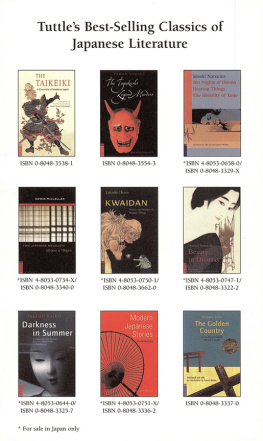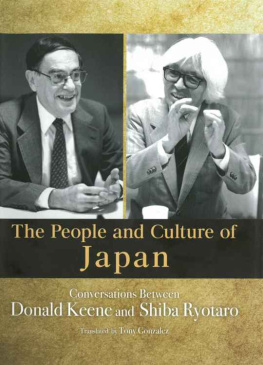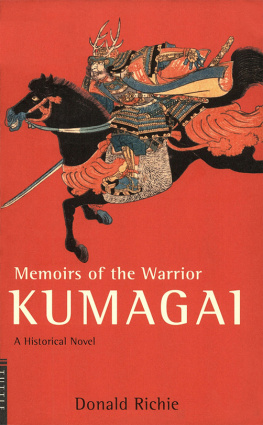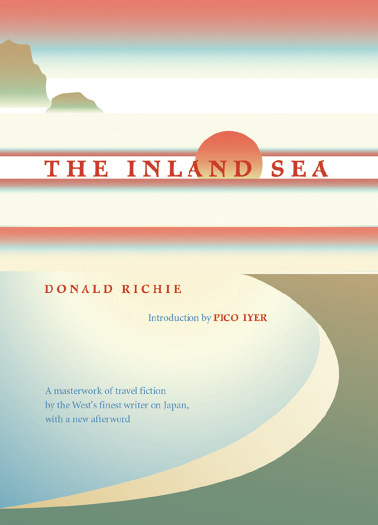P.O. Box 8208 Berkeley, California 94707 tel 510-524-8732 fax 510-524-8711
Text copyright 1971, 2002 Donald Richie.
Introduction 2002 Pico Iyer.
All rights reserved.
Front cover design by D. S. Noble.
No part of this book may be reproduced in any form without permission from the publisher.
Richie, Donald.
The Inland Sea / Donald Richie; with an introduction by Pico Iyer.
p. cm.
ISBN 1-880656-69-8.
1. Inland Sea Region (Japan)Description and travel. I. Iyer, Pico. II. Title.
A Call from the Mist
Introduction by Pico Iyer
THE FOREIGNER IN JAPAN, more than anywhere, stands at the edge of an intimacy that is closing slowly in his face. He walks along a beach, perhaps, as darkness falls, with a young, a beautiful girl, and they talk of loneliness, and all the places he has seen, the nights. The girl offers to introduce him to a local inn, where he will be taken care of, and they walk together up to a private room and sit by the window, looking out at the sea. Then he touches her arm, and the spell is broken. Giggling, she makes her diplomatic retreat. The next morning, when he rises to leave the small town by boat, sailing away into the mist, he sees her there, on the pier, with two friends, waiting for him with presents and goodbyes.
It is a haunting moment, and one that stands for a lifetime of such moments for those of us who find ourselves on this island of half-opened doors. It is made more touching by the fact that the girl knows she will never see the places that she dreams of; all her days will be spent in this forgotten town. And it is made more plangent by the fact that the foreigner confesses to himself (and to us) that the encounter is perplexing to him because he is innocent despite experienceand innocent not only because he sees no point in guilt. The plumbing of innocence and loneliness, the incarnation of a deeply Japanese freedom from cynicism and openness to wonder, the attentiveness to all the fine print, emotional and otherwise, in every fleeting moment are part of what make Donald Richie the most lasting and graceful foreign writer on Japan since Lafcadio Hearn (and before). He apprehends Japan (in all senses) on its own terms, yet puts it in a larger picture. He catches the sound of the sea through the mist, the fishermans no-nonsense explanation of how it will bring him a living, and then the sense of loss that is what the sound, and the explanation, mean. Japan keeps its visitors permanently enchantedand vexedRichie has told us, through its teasing mix of intimacy and distance; it is that same mix, brought to us through a companionable yet solitary traveler, utterly unguarded but always discreet, that gives his own prose its particular strength and beauty. The writing is open, unpretentious, immediate; yet entirely poised, unhurried, at peace with mystery.
For such a large presence, which attracts so many votaries and critics from abroad, Japan has been strangely ill-served by its foreign writers. There is never any shortage of books purporting to lay its secrets bare through a microscopic scrutiny of its business practices, its political structures, or its neon lanes; yet all of them, in the end, say the same thing (about how well Japan manages to keep its public face intact). And faced with the girl on the beach, many foreigners are apt to dilate on sexual mores in Japan; others to start anthropologizing about the persistence of rural custom; still others to talk about the rigid status quo that keeps the girl on the island. Donald Richie is the only one I know who will follow the experience through to where explanations fall away, confide his own clumsiness to us, and not even begin to attempt larger formulations or grand summations. It is, he knows, just an encounter, all but inexplicable, between one stranger and another.
This freedom from an ax to grind and an agenda to pursue is what has helped him to write beautifully and variously on every facet of a culture he has absorbed and loved, from an unsafe distance, for more than fifty years now. It is what has allowed him to write, with a man of cultures impenitence, about its Zen customs and its sex clubs, its emperor and its film industry. Sidestepping special interests and provincialisms, he simply roams around and tells us what the place looks and sounds and feels like: the archetypal Richie scene, as represented here, finds him walking up a hill to a shrine, telling us some of the folklore and history that surround the place, noting how the people move and talk (or dont talk) in this ostensibly holy place and then coming out again with some gentle rumination on Japans relation to silence and worship and time. In The Inland Sea , its striking that he travels with no design grander than to wander; and to record an older, less affected way of life before it dies. The place comes alive to us because he simply talks to peoplekids, old women, gangsters and bargirlsand lets them tell their stories. Often, their stories have no ending, or leave him with a question he knows he cannot answer.
An ease with incompleteness, then, is part of what lights up his wandering meditations, and a refusal of all pomp and cant. At one point here he begins to talk about what the Japanese love of Turkish baths says about their relations between male and female; then he stops because, he realizes, the Japanese would make nothing of it at all. At another moment, he briefly congratulates himself on being able to identify a pavane from Fauronly for the woman at his side to hum along with the melody and tell him where hes wrong. He has left Tokyo, one senses, because the big city is less and less itself (and, what is much the same thing, is taking itself more and more seriously, as a modern Western capital); and he seeks out the forgotten places of the Inland Sea partly because they still have an unselfconscious candor. And yet where other foreigners in Japan regularly write books on looking for the lost, or mourning the beauties that are dying, only Richie manages, first, to find the lost, and then to acknowledge that loss, as much as anything, lies partly in the eye of the beholder. He can afford to be a self-styled romantic only becauselike the country around himhe is so pragmatic.
The reader fortunate enough to join him on his quiet, wistful journey will quickly see that unselfconsciousness and candor are what distinguish the narrator, too. And she will likely find herself carried away by the watercolor beauty of the prose, touched by what Tanizaki, praising shadows, called a pensive luster (its no surprise to learn that Richie is an accomplished painter, as well as musician, actor, and filmmaker). All in sea or sky is tint rather than color, as Lafcadio Hearn wrote, describing the sober and delicate beauty of Japan, an all-temperate world where nothing is garish. Indeed, I would venture to say that there is not a graceless sentence in the book. Richie has no time for artifice, but, we quickly see, he is a serious admirer of craft. His book, then, flows with an easy, natural charm, and yet, at its end, as if by chance we get a long-awaited letter, a searching reflection on the author and his relation to the place where hes chosen to live, and a silvered epiphany on the sea.
The other thing that hits one, reading Richie, is that he is a great writer on Japan partly because he is interested in everything outside Japan; the least dogmatic of foreign observers, he is also the least narrow in his focus. Often, he is able to explain the place because he can set it next to Munich, or Calcutta, or Lima, Ohio; and its very particular way of being and aesthetic he makes familiar to us, and close, by referring to Flemish war paintings, say, or Seneca. It is this background of learning and refinement, I thinkthis interest in painting and music and booksthat helps Richie be merely amused by what rouses anger in many others, and to see what others call hypocrisy as a deeply sincere upholding of a public role.












